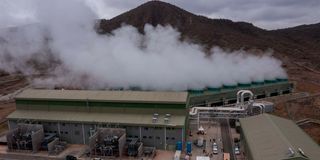MPs mull tough new rules for independent power producers

The Olkaria I Additional Unit 6 geothermal power station in Naivasha, Nakuru County.
MPs want the government to renegotiate all contracts with Independent Power Producers (IPPs), reduce prices by at least Sh10 per unit and pay them in local currency instead of US dollars.
The National Assembly Committee on Energy, which is probing the high cost of electricity, said IPPs should cede ground and reduce the cost of selling electricity by at least Sh10 for the sake of consumers.
In its first meeting yesterday, the committee chaired by Mwala MP Vincent Musyoka said one of the things they are considering is taking the matter to court to bring down the cost of electricity.
"The contract with the IPPs must be in Kenyan shillings. They must be willing to take the risk for the benefit of the end user, the consumer," said Gem MP Elisha Odhiambo.
The MPs were speaking when they met the Electricity Sector Association of Kenya (ESAK), an umbrella body representing IPPs.
"The IPPs must be prepared to reduce the price they sell power by at least Sh10. This is a conversation we need to have and we are ready to go all the way," Mr Odhiambo said.
He said should the IPPs defy the committee's recommendations, he is prepared to sponsor a Bill that would force them to be paid in Kenyan shillings.
"I am ready to propose a law that any contractor coming to Kenya must sign in Kenyan shillings because they are operating within Kenya's borders," Mr Odhiambo said.
Currently, IPPs sell their power at varying costs, with some supplying at Sh26 per kilowatt, while KenGen sells at Sh5 per kilowatt.
If the IPPs reduce the cost by Sh10, Kenya Power will buy it from them at Sh16 and will not pass on the extra cost to consumers.
Auditor-General Nancy Gathungu, in her audit report covering the 2017/18-2020/21 financial years, points out that the comparative cost of power purchase between Kenya Electricity Generating Company (Kengen) and the IPPs shows that it costs Kenya Power an average of Sh5.3 per KWh of power purchased from KenGen, while it costs the company an average of Sh15.3 per KWh of power from the IPPs.
This means that if they reduce the cost by Sh10 as proposed by MPs, they will sell at the same cost as KenGen.
Unused power
Mr Musau pointed out that the clause on paying for unused power needs to be renegotiated as taxpayers cannot pay for power that is generated but not used.
"We are paying you a lot for nothing. That nothing is what we need to renegotiate," Mr Musau said.
The Mwala MP said some of the Power Purchase Agreements (PPAs) with IPPs were signed properly and need to be reviewed.
"In future, we won't enter into PPAs that don't benefit Kenyans," Mr Musau said.
Embakasi South MP Julius Mawathe said they are ready to go to court to get IPPs to reduce the cost of power.
"Let us know how much they are willing to cede ground and come down, but if it takes the courts for Kenyans to enjoy low cost of electricity, then so be it," Mr Mawathe said.
Narok East MP Lemanken Aramat said if the IPPs are not willing to renegotiate their contracts, then they must voluntarily reduce the cost of electricity.
Roysambu MP Augustine Kamande said the deal with the IPPs is punitive and needs to be reviewed.
Most of the contracts are long-term and will end in 2034.
According to the audited accounts for the financial year ending June 2021, KenGen supplied a total of 8,443 gigawatt hours of electricity and was paid Sh44.8 billion while the IPPs supplied only 3,000 gigawatt hours. This is about 30 per cent of the total power, but was paid more than Sh56 billion.
Electricity Sector Association of Kenya Chief Executive Officer George Aluru urged MPs to look holistically at the causes of high electricity costs rather than focusing solely on production and distribution costs.
Electricity Consumers Society of Kenya executive director Isaac Ndereba supported the MPs' call to review contracts with IPPs to be paid in local currency.
"We have allowed these IPPs to come and dictate to us that they must be paid in dollars. This is a discussion we need to have," said Mr Ndereba.
From tomorrow, the committee will start meeting individual IPPs on how to reduce the cost of electricity.





